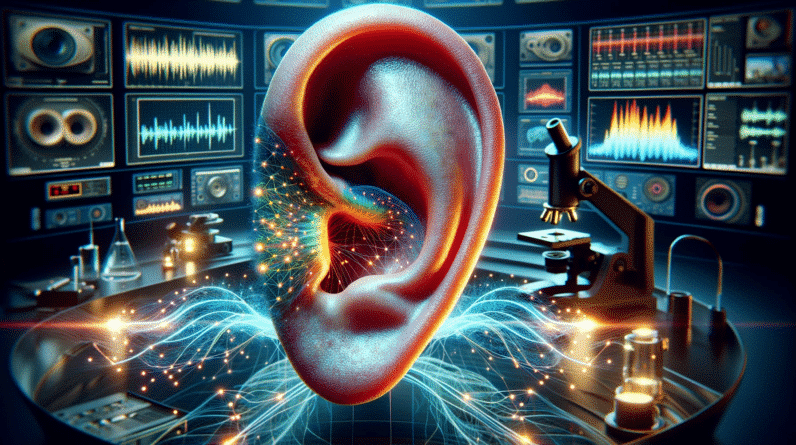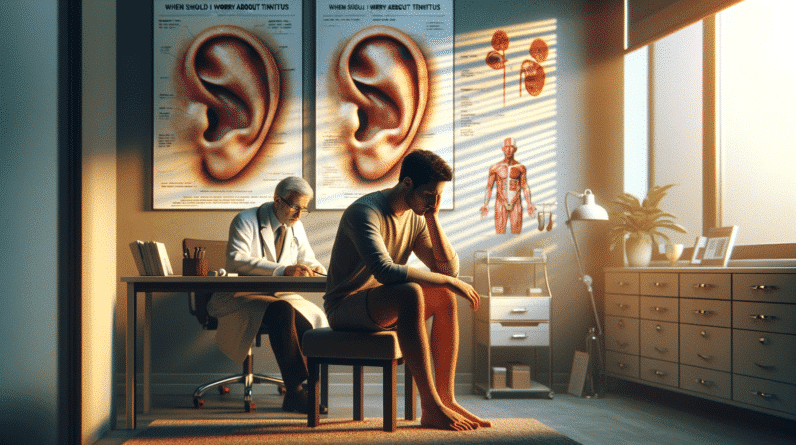
We may earn money or products from the companies mentioned in this post.
As an Amazon Associate I earn from qualifying purchases.
Introduction
Tinnitus is a symptom, rather than a condition itself, characterized by hearing constant or intermittent noises like ringing, hissing, or buzzing that aren’t present in the environment. Often described as a phantom noise, it affects about 15-20% of people and can stem from various underlying causes. One commonly overlooked potential source is the simple act of clenching your jaw, but this connection is more complex than you may suspect initially.
Tinnitus and Its Connection to Jaw Clenching
To truly comprehend tinnitus, you must acknowledge that it’s a diverse phenomenon, spanning from mild background noise to a life-disrupting condition (Understanding Tinnitus). The connection between tinnitus and jaw clenching rests on the anatomy and proximity of the jaw to our ears: the temporomandibular joint (TMJ). This joint is anatomically close to the ear canal, and any strain or stress placed on the TMJ through actions like clenching can directly influence the ear, thereby causing or exacerbating tinnitus.
But does mere jaw clenching cause tinnitus? The answer can be both yes and no, as while the link exists, there often needs to be an otherwise predisposing factor in play. Many patients with TMJ disorders who clench their jaws, knowingly or unknowingly, report aggravating tinnitus.
Symptoms and Types of Tinnitus
The primary symptom of tinnitus is an inexistent noise perceived in one or both ears, with its type and intensity varying from person to person. They might hear it as a constant ringing, buzzing, or whistling, but the common thread is that these sounds persist when no external noise exists.
Blocking the ear with wax could result in patients reporting tinnitus symptoms as the ear’s normal flow of sounds becomes obstructed, creating a sense of fullness and affecting normal hearing (tinnitus from ear wax.) Moreover, tinnitus may not necessarily be a constant annoyance. For some, the symptoms may come and go, waxing and waning throughout the day (tinnitus comes and goes.) A note-worthy observation here is that the act of clenching one’s jaw can exacerbate this condition, making it crucial to diagnose any associated TMJ disorders in such patients.
The Anatomy of the Ear and the Impact of Jaw Clenching
How does the simple act of clenching your jaw influence a complex mechanism like hearing, you might wonder? For this, you need to acquaint yourself with the ear’s anatomy and functionality. The ear comprises three main parts – outer, middle, and inner – each playing a crucial role in transmitting sound waves and converting them to electrical signals understood by the brain.
Right below the ear, where your lower jaw connects to the skull, sits the temporomandibular joint (TMJ). Jaw clenching induces stress and tension on the TMJ, which can resonate into the ear due to its proximity. In many cases, patients noticed that their tinnitus symptoms worsened when clenching the jaw, establishing a clear connection between the two. Thus, maintaining jaw health is a significant aspect of tinnitus management.
Causes and Risk Factors for Jaw Clenching Tinnitus
Having understood the link between tinnitus and jaw clenching, it’s pertinent to delve into the most common causes and risk factors for this condition. Sometimes, an ear infection can lead to tinnitus, as it might result in fluid build-up or inflammation that places pressure on the auditory nerve, causing a phantom ringing or buzzing sound (ear infection causes tinnitus).
But tinnitus isn’t exclusive to ear infections. Various other health conditions can contribute to its onset, including aging, exposure to loud noises, head and neck injuries, and certain medications (conditions that cause tinnitus). Jaw clenching is an under-recognized risk factor for tinnitus, often connected to underlying stress, anxiety, or TMJ disorders.
Diagnosis, Treatment, and Prevention of Tinnitus
If you’ve been grappling with persistent ear ringing, your healthcare provider might suggest a battery of tests. These evaluations often comprise detailed patient history, physical examinations, and specialized auditory assessments (tests for tinnitus).
The treatment approach for tinnitus hinges on its underlying cause. If TMJ disorders induced by habitual jaw clenching are the culprits, interventions might range from physical therapy and stress reduction exercises to dental splints and, in severe instances, surgery (TMJ causes tinnitus). Cognitive behavioral therapy (CBT), sound therapy, and certain medications can also help manage tinnitus symptoms.
Living with Tinnitus
Living with tinnitus often involves a multifaceted approach, blending medical interventions with self-care and lifestyle modifications. Stress management, sound therapy, healthy sleep habits, and regular exercise can all support individuals in coping with the intrusion of tinnitus into daily life. Thankfully, organizations like the American Tinnitus Foundation provide robust resources and support for those affected by this condition (American Tinnitus Foundation).
Future Research and Conclusion
Advances in research are continually shedding light on the etiology and management of tinnitus. Current studies focus on understanding its pathophysiology and exploring novel treatment avenues, including neuromodulation and promising pharmaceuticals. And while tinnitus’s treatment can often be complex, due to the multiplicity of its causes, these targeted insights offer a beacon of hope.
When it comes to jaw-clenching tinnitus, awareness is paramount – recognizing the signs can lead to early intervention and better management of the condition. By understanding the relationship between our oral habits and our auditory health, we can take a significant step toward safeguarding our overall well-being.
Jaw Related Tinnitus - Frequently Asked Questions (FAQ)
Yes, issues with the temporomandibular joint (TMJ), including tension, injury, or disorders, can cause or worsen tinnitus symptoms. This could be due to the close proximity of the TMJ to the inner ear structures.
Tinnitus can be a symptom of TMJ disorders. However, as tinnitus can have many potential causes, it’s essential to have potential TMJ disorder evaluated by a medical professional to prevent misdiagnosis.
Identifying if TMJ disorder causes tinnitus can be challenging. Signs that it might be the cause include changes in tinnitus volume or frequency when you move your jaw, bite, or yawn. It’s crucial to seek medical advice for a proper diagnosis.
Yes, treating TMJ disorder can diminish tinnitus symptoms for some people. Approaches can range from physical therapies, pain management to dental procedures or surgery in severe cases.
Yes, home remedies can help manage tinnitus symptoms caused by TMJ disorders. This could include jaw exercises and relaxation techniques that can help loosen tight jaw muscles and reduce tension.
Amazon and the Amazon logo are trademarks of Amazon.com, Inc, or its affiliates.
Related posts:
- Unlocking the Secrets of Ear Pain and Ringing: Comprehensive Guide to Causes, Symptoms, and Breakthrough Relief Strategies
- Understanding ADHD and Tinnitus: Is there a Connection?
- Antibiotics and Tinnitus: The Hidden Link and How to Protect Your Hearing
- Beyond the Ringing: The Unexpected Connection Between OCD and Tinnitus





